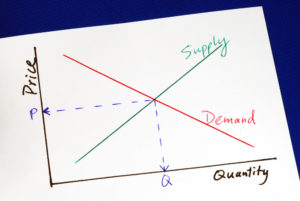
Back in 2019, entrepreneur Nick Hanauer gave a Ted Talk called “The Dirty Secret of Capitalism – And a New Way Forward.” Recently, a quote from the talk (which starts at the 14:53 mark of the linked video) has been making its way around social media. Hanauer says:
This statement by Hanauer is confused. He conflates three very different things: 1) economic laws, 2) economic theory, and 3) social norms. Theories are distinct from laws. Different theories can use the same laws to arrive at different outcomes. For example, both socialist and liberal economic theory accept the validity of the Law of Demand (which he bizarrely calls “equilibrium” at the 4:30 mark), but the theories contain different assumptions. Economic laws derive from the problem of scarcity, just like many physical laws derive from conditions of the physical world. We can no more choose to do away with scarcity than we can choose to do away with gravity.

Then, he dismisses what he calls “neoliberal economic theory” as “social norms based on pseudoscience.” But all science is, to some extent, based on social norms. Science is a process done by humans who exist within larger professional and societal institutional frameworks. Those, in turn, all have their own societal norms which influence behavior.
In the video he is trying to argue that “neoliberal economic theory” is attempting to impose social norms onto a group. Perhaps, but again, any theory that becomes policy is doing the same thing. COVID-19 policy, for example, attempted to impose many social norms onto groups including (but not limited do) constant masking, social distancing, and following technocratic advice without question. So, it’s not clear why he thinks “neoliberal economic theory” is any different. To the extent that “neoliberal economic theory” is a theory, then it is not attempting to impose social norms onto a group, but rather explain what is; social norms are generally taken as given.
There is a lot to criticize in Hanauer’s talk. The talk is very confused and he makes very basic mistakes. But I want to end with praise. In one of the few items he gets conceptually correct, Hanauer criticizes modern economic theory’s over-reliance on utility maximization. Classical liberal economics, from Adam Smith in 1776 through Friedrich Hayek, James Buchanan, Deirdre McCloskey, and my teachers at GMU have been arguing against strict utility maximizing and more “sympathetic” behavioral explanations of human behavior. One of the virtues of free market economics is that it treats people as people rather than mindless utility maximizers who simply respond predictably and unerringly to incentives. I agree with Hanauer that economics should refocus along virtuous behavior and social behaviors. But that means embracing liberal economics and capitalism, not rejecting it.
Jon Murphy received his PhD in economics from George Mason University and is an Instructor at Western Carolina University.

READER COMMENTS
Richard W Fulmer
Aug 21 2022 at 1:24pm
Hanauer’s assertion that, “If we want a new economics, all we have to do is choose it,” echoes claims that society is merely a social construct that we can change at will. Neither claim reflects any understanding that complex systems are not designed. Instead, they evolve through the trial-and-error actions of countless people over many years.
I worked in IT for almost four decades and I recall a coworker who said that he hated IBM because they kept making changes to their mainframe operating system. “They’re nickel-and-diming us to death! Why don’t they just get it right?”
I replied, “And how about those Wright Brothers with their ridiculous biplane? Why didn’t they just build a 747 and be done with it?”
Monte
Aug 21 2022 at 5:18pm
Isn’t Hanauer’s pep talk just a rehashing 3rd way politics? His 5 rules of thumb certainly seem to echo its basic tenets:
And, of course, the familiar Fight for $15 refrain, a wage increase which a majority of Americans now appear to favor.
Jon Murphy
Aug 21 2022 at 5:40pm
Maybe? I don’t know 3rd Way.
Fight for $15 is probably irrelevant now (in most areas) as nominal wages in many places have risen above $15
David Seltzer
Aug 21 2022 at 5:34pm
“If we want a new economics, all we have to do is choose it.” Economics (group noun) is about the preferences of humans that are revealed in their subjective choices.
johnson85
Aug 22 2022 at 4:49pm
Yea, his statement, to the extent it makes any sense at all, is either a statement along the lines of “if we want a new economics, all we have to do is choose to change human nature” or “if we want a new economics, all we have to do is enact authoritarian laws to take away choice.”
I am guessing it’s not either of those and it’s just a nonsense statement that all we have to do to eliminate the problems of scarcity is wish hard enough.
David Seltzer
Aug 22 2022 at 5:49pm
Good point. Thanks.
Brandon Berg
Aug 22 2022 at 11:07pm
Quick reminder that in his infamous 2012 TED Talk, Nick Hanauer used a chart with fabricated data to manufacture a strong correlation between between top marginal tax rates and unemployment out of whole cloth.
Comments are closed.